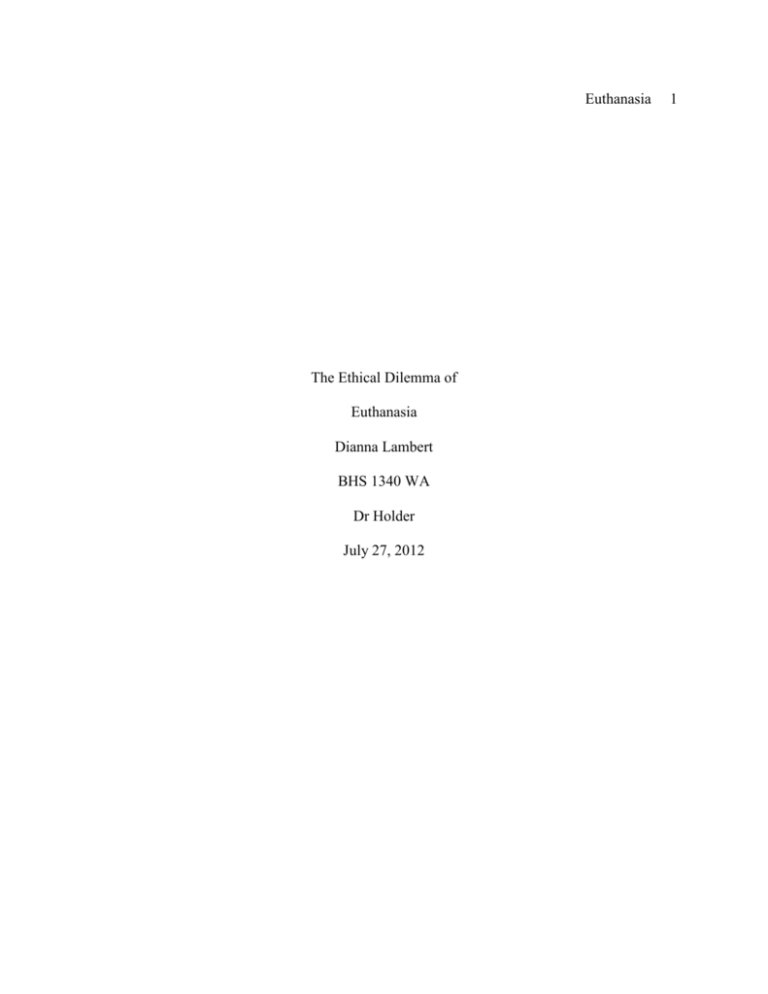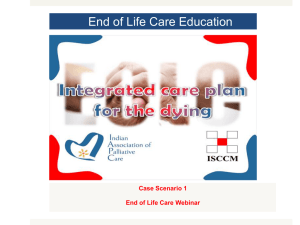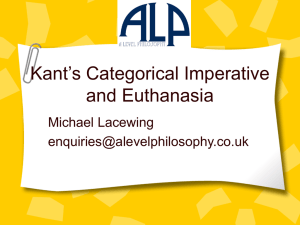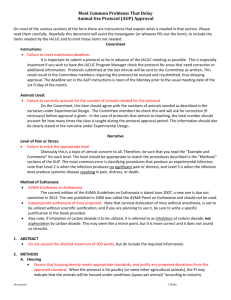The Ethical Dilemma of Euthanasia
advertisement

Euthanasia The Ethical Dilemma of Euthanasia Dianna Lambert BHS 1340 WA Dr Holder July 27, 2012 1 Euthanasia 2 The Ethical Dilemma of Euthanasia Euthanasia, also known as mercy killing, is a very controversial issue. Many people feel they have the right to end their life when they view the quality is no longer worthwhile. While others feel is unjust to choose their own time of death, leaving a detrimental effect on loved ones. Egoism and utilitarianism are two moral theories that apply to euthanasia. The two theories can be used to both support and oppose the moral dilemma of euthanasia. Egoism In egoism, a person contends that they act in a way that is best for their own well-being. They do things to avoid as much pain as possible. Supporting data by Margaret P Battin appeared in a book (cited in Euthanasia: Opposing Viewpoints, 2000), “The moral right for self-determination is the right to live one’s life as one sees fit, subject only to the constraint that this not involve harm to others” (p. 52). Egoists believe that dying will be a benefit and an end to their sufferings. They do not take into consideration the grief and sorrow that it will bring to their loved ones. They only consider their own interests and disregard the effects on family and friends; they feel no harm is being done to them. Under the first amendment, a person has the right to privacy, which many egoists feel is the right to choose their time to die. And blogger Michael Laughlin (2005) writes that the Declaration of Independence also grants people the right to choose: We hold these truths to be self-evident: That all men are created equal; that they are endowed by their Creator with certain unalienable rights; that among these are life, liberty, and the pursuit of happiness;…. ‘(United States Declaration of Independence). This quote sets in motion the argument that each person has the right to decide what type of life is best for them. A death with dignity may be preferred to a life of pain and suffering. (¶ 4) Euthanasia 3 On the contrary, some egoists may be against euthanasia. They may see euthanasia as a time when someone else has control over their well-being; a time when they have lost control over the decisions for their life. For someone else to have the power to make the choice to “pull the plug” would not be acceptable because they have no control of their own destiny and happiness. In The Stanford Encyclopedia of Philosophy, Robert Shaver (2010) writes, “G.E. Moore argued that ethical egoism is self-contradictory. If I am an egoist, I hold that I ought to maximize my good. I deny that others ought to maximize my good (they should maximize their own goods)” (Ethical Egoism ¶ 17). Utilitarianism In utilitarianism, the patient’s mind assesses the consequences of an action. The morally correct course of action consists in the greatest good for the greatest number. They weigh the pros and cons of their actions. The pros they may assess in euthanasia are, the family will be free of worrying about the patient, they are saving money for the family by not having the cost of medication, doctor visits, hospital or skilled nursing facility charges and more. When committing euthanasia, it will allow the hospital, doctors and nurses to have the room and time to do good for more, such as helping and healing other patients. A utilitarian who is suffering with a terminal illness and has knowledge of his/her impending death may view the quality of life they had prior to their illness as the greatest good for the greatest number; they may possibly feel that prolonging their sickness would be morally wrong. Dr. Elizabeth Telfer writes in her paper, Philosophical Approaches to the Dilemma of Death with Dignity: The Hedonistic Utilitarian would say that situations often arise in which a person’s continued existence brings more pain than pleasure both to them and to all those who are distressed by Euthanasia 4 their suffering – not to speak of the resources which are being spent on keeping them alive and which would produce more happiness if used in other ways. (¶ 7) Some utilitarians view euthanasia as the polar opposite of doing the greatest good for the greatest number. They may argue that not only does the action of euthanasia affect many family members and friends; they fear it will encourage the “slippery slope” effect. The “slippery slope” effect is killing people who are thought to be undesirable, which may undermine professionals in the healthcare field, making them less committed to saving lives. They may fear that the “slippery slope” could lead to eventual involuntary euthanasia and doctors having less regard for the fundamental principles for the preservation of life. Doctor’s may give up quicker on terminally ill patients, which would mean a great decline in care for those near the end of their lives. Supporting data by John Shelby Spong appeared in a book (cited in Euthanasia: Opposing Viewpoints, 2000), “Convenience and greed, in cooperation with a few unscrupulous members of the medical profession, have the potential to create a world of horrors for many people” (p. 44). Conclusion The ethical dilemma of euthanasia has been and I think will always be a hot topic of controversy. It seems that whether you are an egoist or utilitarian, the moral theories don’t change but an individual’s view of an ethical dilemma can be argued in very different ways. Choices that seem right in some societies are found to be completely wrong in others. I’ve learned that egoists and utilitarians can view moral issues in a positive or negative light (I’m sure that all of the moral theories have this same way of viewing things, either as a pro or a con). In my thinking, I thought that both egoists and utilitarians would only see the pros in euthanasia. Euthanasia References Laughlin, M. (2005, November 21). Ethics of euthanasia: Life or death: Whose decision is it? Retrieved July 20, 2012, from http://voices.yahoo.com/ethics-euthanasia11185.html?cat=70 Shaver, R. (Winter 2010). The Stanford Encyclopedia of Philosophy online. Retrieved from http://plato.standford.edu/archives/win2010/entries/egoism/ Telfer, E. (n.d.). Philosophical approaches to the dilemma of death with dignity. Retrieved July 20, 2012, from http://www.euthanasia.cc/telfer.html Torr, J. D. (Ed). (2000) Euthanasia: Opposing viewpoints. San Diego, CA: Greenhaven Press 5





